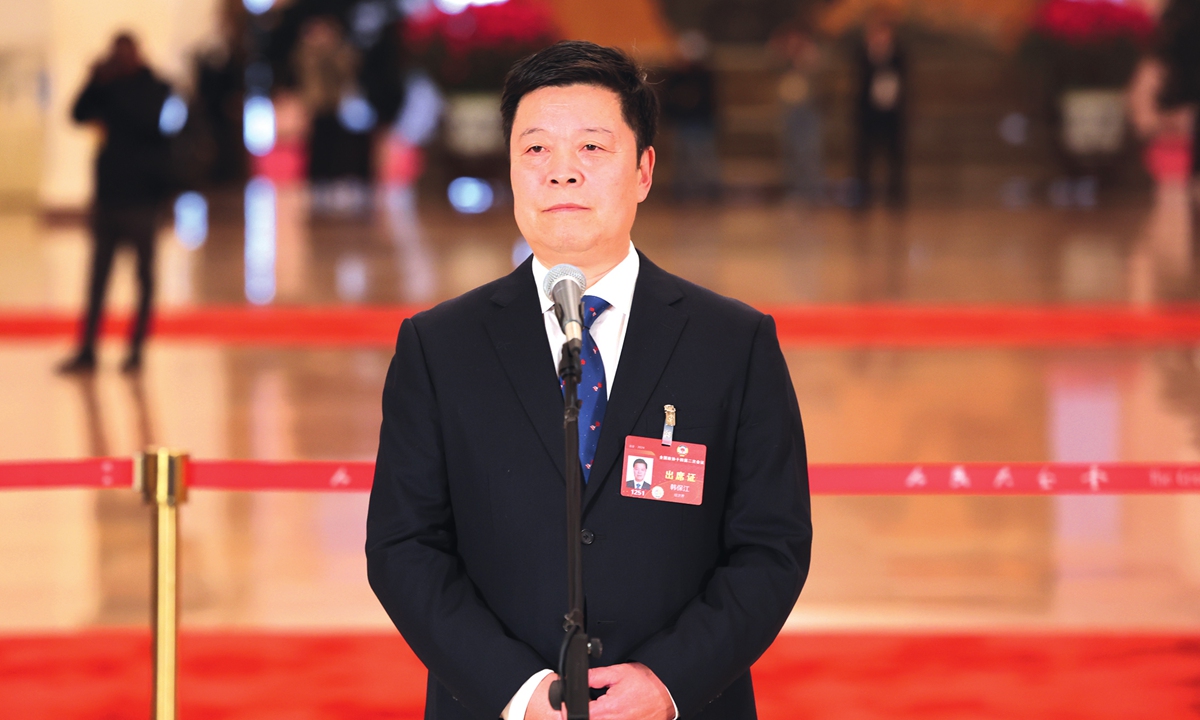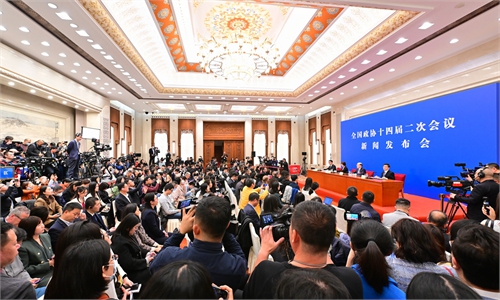Western doomsayers don’t understand governing mechanism, course of Chinese economic development: political advisor


A view of Guangzhou, South China's Guangdong Province Photo: VCG
China officially kicked off the two sessions this week, and the highly-anticipated Government Work Report, which contains a cluster of key economic goals, will be delivered. What we most look forward to is the formulation of some economic development indicators this year. Ultimately, it's about how the central government sets economic growth targets, especially regarding how to focus on the transformation of China's economy, while tackling with downward pressure and external uncertainties.
In fact, everyone is looking forward to what kind of signals the two sessions will bring to China's social development and how it will properly guide social expectations. The tone-setting political gathering is also a timely, clear response to certain pessimism voices on Chinese economy, especially from the international society. I think this is also the most important aspect of this conference.
There have been a lot of hypes on Chinese economy in recent days, ranging from rhetoric such as the collapse of the Chinese economy, economy hitting a ceiling, to economy recession claim. But all of them are groundless and those Chinese economy doomsayers basically don't understand the governing mechanism of Chinese economy and the course of its development. They interpret Chinese economy through the lens of basic theories and values derived from modern Western economics, as well as Western market economy theories.
But the reality of Chinese economy requires the international community to understand it from China's own perspective. For example, in the field of economics what the US scholars and politicians have experienced is only the scenarios involving marketization and modernization of a 300-million population. And obviously when it comes to the Chinese modernization involving a country with 1.4 billion people, it's very challenging for them to understand the development vigor and potential the economy could release, with their limited tools and methodologies in hands. China's uniqueness is undeniable, and it is essential to recognize the special characteristics of the Chinese economy.
Also, many people who study Chinese economy tend to amplify negative data they see, and this is how rumors are being spread internationally.
We've been hearing bearish views on Chinese economy not just today, but since the 1990s. It has been approximately 30 years, yet China is still standing firm here. Even though we currently face downward pressure, including insufficient demand and weakened expectations, if you look at the fundamentals of China's economic development, it's still very robust - no matter from the aspects of people's improving livelihood, stable consumer price, rising residents' incomes or better corporate profits.
The smearing against Chinese economy is clearly inconsistent with the positivity it has been released. Last year, our residents' incomes - both urban and rural - outpaced GDP growth, and rural residents' incomes even surpassed those of urban residents. This actually contributes to social stability and the sense of security and happiness of Chinese people.
There's more potential to be tapped into with China's gradual expansion of middle-income group in the years to come. We currently have only around 400 million middle-income population, and when China achieves the income levels of a moderately developed country in the future, there will likely be 700 to 800 million middle-income population. And that will bring a multiplier effect of China's demand and investment, which may even surpass the readings that a moderately developed country could achieve.

Han Baojiang Photo: VCG
Rebutting 'Chinese economy Japanization'
Some foreign media outlets have also peddled the so-called "Chinese economy Japanization" since last year, with sensational headlines claiming that China's economic slowdown bears resembles to that of Japan three decades ago, and concluded that the world's second-largest economy could risk facing "lost decades" in the near future.
We must acknowledge that the slowdown of the Chinese economy is an inevitable trend for all economies as they progress, as development always involves the core issue of economic structure transition. And also, GDP won't always fly high as development quality improves.
But it is important to note that the Chinese economy is fundamentally different from that of the Japanese economy back then. Firstly, the scale is different. The Japanese economy didn't have a vast domestic market like China and because of a narrow domestic market space, a large amount of Japanese capital had to fleet into the world. On the contrary, China has a huge domestic demand. Even though many Chinese companies now seek opportunities internationally, the reality is that with the expansion of domestic demand and the development of the domestic economy, the space we provide for Chinese companies to develop domestically is also enormous.
Second, Japan has a population of 200 million, while we have 1.4 billion people, which carries ramification for abundant labor supply despite aging issues. Our incremental labor force is decreasing, but China's existing stock of labor force is still significant. The quality of China's existing labor force, along with the cultivation of our own Chinese entrepreneurs through decades of marketization and internationalization, also presents an overwhelming edge in human capital. And potential labor shortage issue could be gradually resolved through structural optimization and policy adjustments.
The Western distortion narrative against Chinese economy, which has persisted for years, is also fueled by their ideological biases. They always seated nervously with China's rise.
However, regardless of how external situation evolve, China needs to focus our efforts on doing our own things well. Chinese policymakers are sober and their approach to economic development - as shed light by the Central Economic Work Conference and the Government Work Report - is very clear. As long as we improve our economy, enhance people's livelihoods, and ensure employment, it is probably the most effective way to deal with all challenges. And the Chinese doomsayers could do nothing but sit there uneasily.
The opinion is based on an interview with Han Baojiang, a member of the National Committee of Chinese People's Political Consultative Conference and a professor at Party School of the Central Committee of the Communist Party of China (National Academy of Governance).


